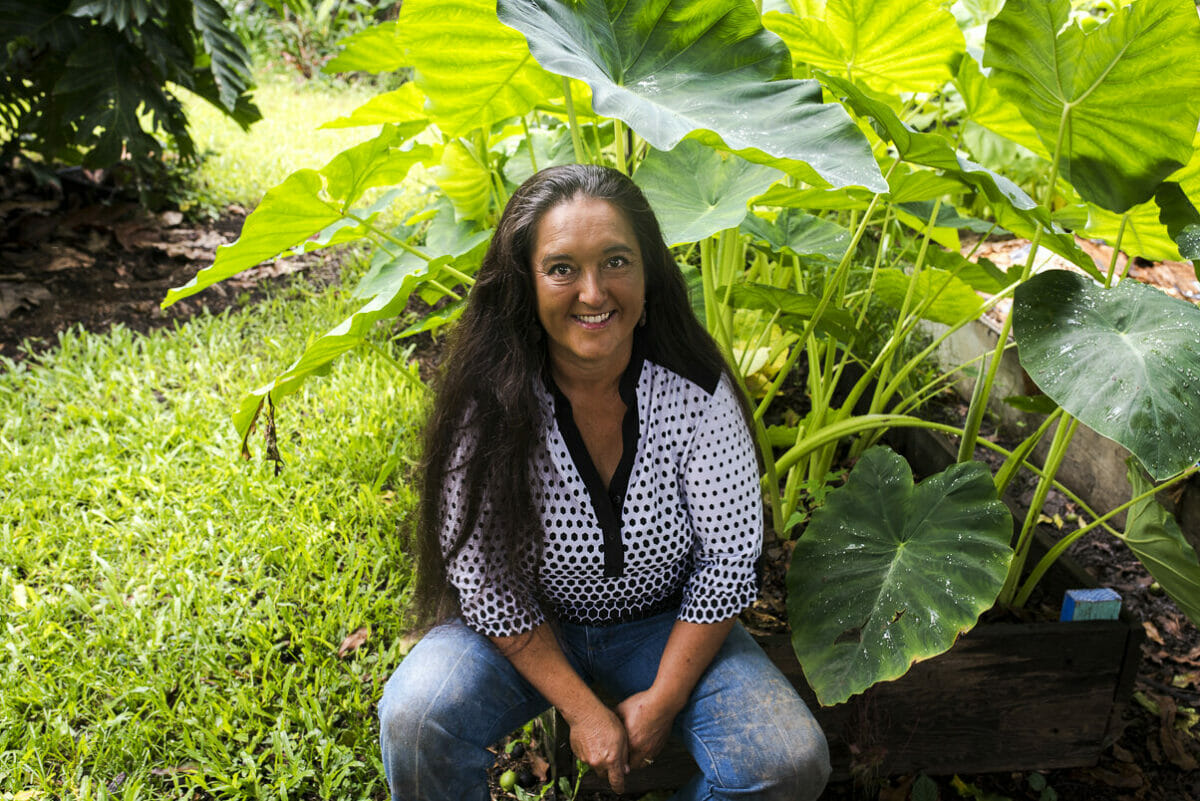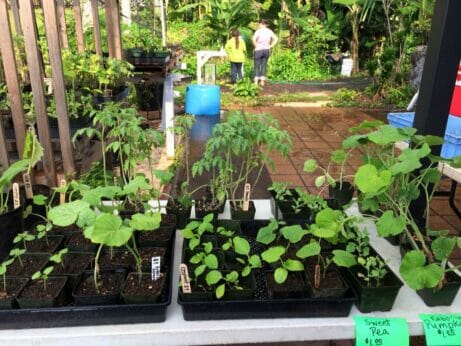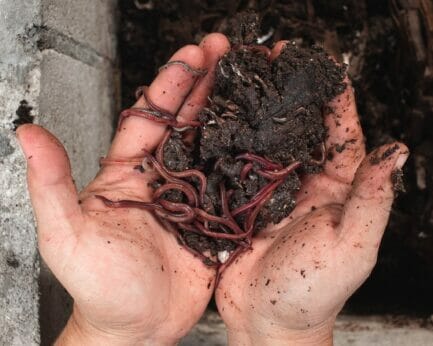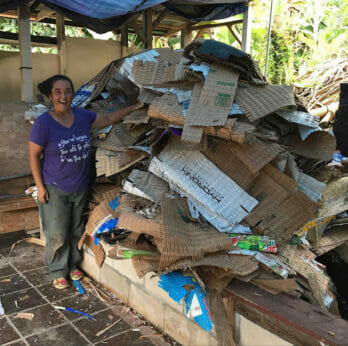Meet the Hawai’i Farmer Turning Island Waste into a Composting Community
In South Kona, Emiko Chantal Chung wants to create a relationship-rich ecosystem to feed local families and transform waste management, starting with her beloved worms.
Meet the Hawai’i Farmer Turning Island Waste into a Composting Community
In South Kona, Emiko Chantal Chung wants to create a relationship-rich ecosystem to feed local families and transform waste management, starting with her beloved worms.

Emiko Chantal Chung.by Ronit Fahl.
In 2007, Emiko Chantal Chung was asked to help plan a multi-million-dollar civic center on land that was once a botanical garden she had wandered through as a child. The land had since turned into an illegal dumping ground.
At the time, she was working for a Hawaiian culture-based preschool as a family advocate and, while the civic center was supposed to be for the community, Chung felt an intuitive nudge that the land was meant for something else.
A year later, the recession hit and investors pulled out of the project. It was then that she and two of her friends, Hala Medeiros and Lovey Simmons, realized they wanted to build more for their children and opt into a decolonized system of living that favors people over profit.
“So we started off with food. How can everybody be fed?” says Chung.
A vision of community
Over the next four years, a grassroots effort of volunteers, neighbors and equipment donors helped clean up the land to prepare it for what was next: Ma’ona Community Garden, Hawai’i Island’s first community garden. Founded by Chung, Medeiros and Simmons, the garden grew out of an effort to create more community access to nutritious, sustainably grown food.
Now, more than a decade later, the 5.4 acres of land have been transformed to create a multifaceted food system designed to meet the needs of local families and empower food sovereignty, particularly for the Native Hawaiian and other Pacific Islander communities most in need.
Currently, Hawai’i imports 85-90 percent of its food and, according to a report tracking the incidence of financial hardship in Hawai‘i, 44 percent of people cannot afford basic necessities. In 2015, in Hawai’i County alone, that number was 55 percent, with Native Hawaiians and other Pacific Islanders disproportionately represented.
Recently designated a USDA People’s Garden, Ma’ona (which in Hawaiian means “full or satisfied after eating”) produces an abundance of fruits and vegetables, some of which are grown in several demonstration gardens, along with individual and family plots that provide land access to local residents to grow what they want.
Ma’ona also grows the traditional staple crop of ulu (breadfruit) in partnership with Māla Kalu’ulu, an organization restoring the ancient breadfruit agroforests that existed prior to colonization. Taro, another traditional food staple, is also grown on the property, and there is also an experimental food forest and fruit germplasm repository maintained with another partner, Hawai’i Tropical Fruit Growers, to store and study fruit seeds and genetic material. The garden also features a 3,500-gallon aquaponics operation that grows watercress and ong choi, as well as traditionally farmed fish such as awa and ‘ama’ama.

The garden’s focus on community includes free community workshops on how to grow food and monthly food plant giveaways. There are also work-shares available for those needing to fulfill USDA work requirements to receive Supplemental Nutrition Assistance Program (SNAP) benefits.
“This way, some of them can bring their kids, so they don’t have to worry about paying for childcare,” says Chung.
A wormy waste management system
In 2016, Ma’ona started its Community Composting Project, which has evolved into the island’s most impressive community waste management operation.
The state of Hawai’i County’s waste infrastructure is dire, with one of only two landfills permanently closed. Not long after China stopped accepting plastics from other countries, Hawai’i County’s private contractor Business Services Hawai’i said it could no longer afford to process most types of plastic waste, so the county ceased accepting a majority of it for recycling.
When you enter Ma’ona, one of the first things you see are stacks upon stacks of cardboard, bags stuffed with shredded paper and a lot of plastic waste and glass bottles, all surrounding more than a dozen forty-by-four-foot vermiculture bins.
Inspired by models made in India, the bins are used for thermophilic composting, which encourages microbial activity to generate heat levels that kill off human pathogens and other bacteria. They hold thousands of worms that process food waste into what Chung says is some of the finest compost on the island.

Chung partners with Hawaii’s Ulu Cooperative, a co-op made up of more than 80 local farmers, to take care of their food waste. In the early days of their partnership, before enlisting other composters, she was composting a thousand pounds of food waste a week.
To expedite the breakdown process, Chung helps redirect other waste streams from paper and cardboard; the latter usually gets shipped to Asia or ends up in the only landfill available on island. The cardboard takes 4 to 6 months to break down in the bins. It not only helps sequester carbon in the soil, but it supplies energy to the microbes as it decomposes, improving soil quality and structure. According to Chung, the worms love it.
Chung used to scavenge for the cardboard all over Kona and shred it herself, but in the last two years, she has been partnering with the mobile shredding company Circlepack with machines to do it for her. The garden now hosts a 24/7 drop-off for communities and businesses for monthly community cardboard shreds, which typically yield up to a thousand tons of cardboard that can be put to productive use, either at Ma’ona or dispersed among other farmers.
Fifteen of the worm bins produce compost she uses for the rest of her operation, and the rest is donated to schools and organizations and distributed to farmers and gardeners, many of whom are sitting on a long wait list to receive it.
“This place runs on relationships,” says Chung.”It’s the people and their relationships in the community that make this happen.”
She began building a new worm bin in February that will incorporate glass and plastic bottles into the eco-bricks that make up the bin’s concrete structure. Prior to being entombed in the concrete blocks, the eco-bricks will have 1.5 to 2 lbs of non-recyclable plastic pushed inside, which will amount to about 300 lbs of plastic encased in 200 bricks.

“I’m not a big waste management company or a multinational corporation who wants to run those sales. I’m in a direct relationship with farmers and producers,” says Chung, adding that she doesn’t want to service people outside of a 15-mile radius.
Chung says she would like to see her model replicated. “My greatest joy would be to see twenty to thirty of these [operations] all around the island, producing for their farmers from their farmers; servicing every food hub, every food processor.”
As for what’s next, she wants to build a certified kitchen, which is necessary to process food and legally sell it. Chung has also been thinking about how farmers like herself can best support each other’s well-being and mental health—a struggle in the industry that has become nationally recognized as a public health crisis over the last few years.
The solution, she thinks, comes down to what Ma’ona is founded on: relationships.
“What I want to see, seven generations from now, is a secure, well-fed, relationship-rich ecosystem of people that are prosperous, where the land is fruitful and well taken care of and where everyone is taking care of each other.”
Follow us

This work is licensed under a Creative Commons Attribution-NoDerivatives 4.0 International License.
Want to republish a Modern Farmer story?
We are happy for Modern Farmer stories to be shared, and encourage you to republish our articles for your audience. When doing so, we ask that you follow these guidelines:
Please credit us and our writers
For the author byline, please use “Author Name, Modern Farmer.” At the top of our stories, if on the web, please include this text and link: “This story was originally published by Modern Farmer.”
Please make sure to include a link back to either our home page or the article URL.
At the bottom of the story, please include the following text:
“Modern Farmer is a nonprofit initiative dedicated to raising awareness and catalyzing action at the intersection of food, agriculture, and society. Read more at <link>Modern Farmer</link>.”
Use our widget
We’d like to be able to track our stories, so we ask that if you republish our content, you do so using our widget (located on the left hand side of the article). The HTML code has a built-in tracker that tells us the data and domain where the story was published, as well as view counts.
Check the image requirements
It’s your responsibility to confirm you're licensed to republish images in our articles. Some images, such as those from commercial providers, don't allow their images to be republished without permission or payment. Copyright terms are generally listed in the image caption and attribution. You are welcome to omit our images or substitute with your own. Charts and interactive graphics follow the same rules.
Don’t change too much. Or, ask us first.
Articles must be republished in their entirety. It’s okay to change references to time (“today” to “yesterday”) or location (“Iowa City, IA” to “here”). But please keep everything else the same.
If you feel strongly that a more material edit needs to be made, get in touch with us at [email protected]. We’re happy to discuss it with the original author, but we must have prior approval for changes before publication.
Special cases
Extracts. You may run the first few lines or paragraphs of the article and then say: “Read the full article at Modern Farmer” with a link back to the original article.
Quotes. You may quote authors provided you include a link back to the article URL.
Translations. These require writer approval. To inquire about translation of a Modern Farmer article, contact us at [email protected]
Signed consent / copyright release forms. These are not required, provided you are following these guidelines.
Print. Articles can be republished in print under these same rules, with the exception that you do not need to include the links.
Tag us
When sharing the story on social media, please tag us using the following: - Twitter (@ModFarm) - Facebook (@ModernFarmerMedia) - Instagram (@modfarm)
Use our content respectfully
Modern Farmer is a nonprofit and as such we share our content for free and in good faith in order to reach new audiences. Respectfully,
No selling ads against our stories. It’s okay to put our stories on pages with ads.
Don’t republish our material wholesale, or automatically; you need to select stories to be republished individually.
You have no rights to sell, license, syndicate, or otherwise represent yourself as the authorized owner of our material to any third parties. This means that you cannot actively publish or submit our work for syndication to third party platforms or apps like Apple News or Google News. We understand that publishers cannot fully control when certain third parties automatically summarize or crawl content from publishers’ own sites.
Keep in touch
We want to hear from you if you love Modern Farmer content, have a collaboration idea, or anything else to share. As a nonprofit outlet, we work in service of our community and are always open to comments, feedback, and ideas. Contact us at [email protected].by Libby Leonard, Modern Farmer
March 30, 2023
Modern Farmer Weekly
Solutions Hub
Innovations, ideas and inspiration. Actionable solutions for a resilient food system.
ExploreExplore other topics
Share With Us
We want to hear from Modern Farmer readers who have thoughtful commentary, actionable solutions, or helpful ideas to share.
SubmitNecessary cookies are absolutely essential for the website to function properly. This category only includes cookies that ensures basic functionalities and security features of the website. These cookies do not store any personal information.
Any cookies that may not be particularly necessary for the website to function and are used specifically to collect user personal data via analytics, ads, other embedded contents are termed as non-necessary cookies.
Sounds good. But the figures of people not being able to afford basic necessities seem high. Anything that helps people eat cannot hurt.
Check out David Blume. He is an advocate for the production of ethanol fuel, especially at local, small and medium scales through permaculture farming-
This site is very educative